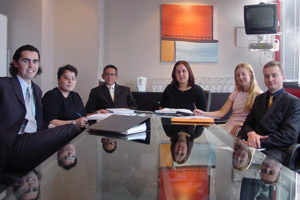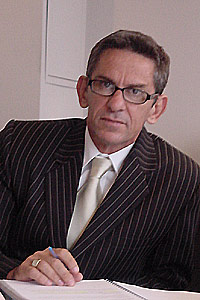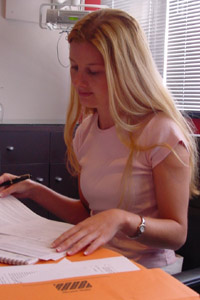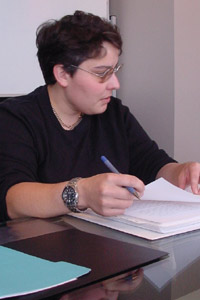18 November 2003

The legal team working on Ms Zhang's case. |
|

Gold Coast criminal lawyer Chris Nyst initiated the students' involvement in the case. |
|

22-year-old Jodie Warren is the youngest member of the team: "I really enjoy it so it doesn't feel like I'm doing work." |
|

Law student Kathryn Young leapt at the chance to work on the case: "This is a chance to actually do something." |
When you enrol in a law degree at uni you know you're
Law student Kathryn Young leapt at the chance to work on the case: "This is a chance to actually do something."
When you enrol in a law degree at uni you know you're in for a hard slog.
You know there'll be a lot of long nights in the library before your legal
talents get to see the light of day, let alone a real case.
And when it comes to international human rights law the odds of seeing a real
case are even slimmer. Every now and again you hear about human rights cases
popping up in the news and they are long and drawn out things. But right now on
the Gold Coast a landmark human rights case is on the boil.
And three Griffith University law students are in the thick of it.
For 28-year-old student Kathryn Young, the case has become thoroughly
engrossing. "When you find yourself at 10 o'clock on a Friday night going
through torture case after torture case and looking at what's acceptable ways to
kill people and what's acceptable force...You know, people having their eyes
popped out because they were beaten so badly. You just think, 'wow'."
The case relates to the torture of a Chinese woman now living in Sydney. Zhang
Cui Ying is one of many Chinese nationals persecuted during the reign of former
president Jiang Zemin for their involvement in the spiritual movement Falun
Gong. What makes her case unique is that it's the first to be brought by an
individual.
The landmark case has attracted the likes of Gold Coast Criminal lawyer Chris
Nyst and eminent human rights lawyer Geoffrey Robertson of "Hypotheticals" fame.
It's not everyday a lawyer takes on the UN. Certainly not everyday students get
to work on a case that will end up in the UN Human Rights Commission in Geneva.
The uniqueness of the opportunity is not lost on Ms Young. "Oh my God, there's
an international human rights case on the Gold Coast. This is a chance to
actually do something. And then when I found out what it was - China. Okay, it's
China, it's pretty big. And then I found out I'd be working with Chris Nyst who
I'd just heard of from the Pauline Hanson case. I thought, 'Wow, this is going
to be pretty interesting and exciting'. And then it was like Geoffrey Robertson
who I've been a fan of since 10 years now. I know all his 'Hypotheticals' off by
heart."
High profile lawyer Chris Nyst has 25 years of experience in criminal law to his
name but, even for him, this case represents a career highlight. "These sort of
things are unusual for any firm. I mean, you don't go to the United Nations
every day. In the course of a career you might only become involved in two or
three of these cases."
It was Nyst who initiated the students' involvement in Ms Zhang's case. He says
it's a win-win situation. "The students bring some energy and passion to these
things. They bring certainly up-to-date research skills and so that's great from
a client's point of view. And from the students' point of view, to actually have
exposure to the practical side of law and be able to put those skills to work is
a fantastic thing."
This is not your average work experience. The students are far from the
sidelines. They are integral to the team, their latest task the formulation of a
dossier of human rights abuses throughout the world.
At 22, Jodie Warren is the youngest member of team. "The hardest part I've found
is once we're given a task to go out and find exactly the parts that are
relevant, what we're looking for. There's just so much material out there." But,
in contrast to uni assignments, motivation is never a problem when it comes to
the Zhang case. "The process is long and it takes a lot of hours but at the same
time when you're doing it you know in the back of your mind that it's for a good
cause and the work that we do is helping someone."
"It can be difficult. Exams are coming up now so it's hard to try to find the
time. For me mostly it's at night time in the library doing research. But I
really enjoy it so for me it doesn't feel like I'm doing work."
Ms Young concurs. "The really fun bits are trying to find ways to actually get
this case to be prosecuted and something to be done. The really disturbing bits
are looking at the pictures of people who've been beaten to death. That hasn't
been very fun."
Certainly the lessons learned around the boardroom with Chris Nyst can't be
replicated within the four walls of a lecture theatre. Ms Warren articulates
perhaps the greatest lesson learned so far. "I've basically learned that there's
a big gap between law and practice - especially in the field of international
law. What countries say they are going to do when they sign on and ratify
treaties is usually a lot different to what they actually do in real life.
International law, especially human rights law, is basically just a matter of
politics. Sometimes states won't adher to human rights law if it's not
politically expedient or politically in their interests."
Ms Young has also noticed a stark contrast between international law and
domestic law. "You get really sad sometimes and you get really upset that it is
going to take so long. But I've learnt so much about the processes of the UN,
how to get something through the ICJ - is it possible on a political level? You
know, we've just had the chairman of China out here. That affects everything.
"It's not like going to court where you've got a judge there and a police force
to back it up. You're dealing with people on an international stage and it's all
politics and people with guns. American can do whatever they want, so can China.
So it's been really amazing."
Chris Nyst cannot speak highly enough of the students. "These students are
really the best of the best. They have grown enormously. You see a scenario
where the students come in a little bit tentative because they really don't
know, 'Well, am I going to be of any value here at all?' And when you understand
it's like building a house - you just start with one brick and you put another
brick on top of it. As they see that process and they understand, 'Well, I can
put that brick on top of there,' it helps them to blossom as contributors in the
team."
Ms Warren says the case has changed her outlook personally as well as
professionally. "I think it's made me appreciate being an Australian. I think
sometimes a lot of Australians take for granted the rights and opportunities we
have. You just have to look at what's happened to Miss Zhang in China to realise
we live in a great country although we have our own problems as well. We just
have to appreciate that we won't be hauled off and tortured as is the common
practice in some countries."
Ms Young agrees that the Australian society is a great one and praises our
democratic system and the role Australia has played in advancing human rights.
"We've had some amazing human rights cases where our own domestic legislation
has been changed with the whole Toonen case allowing gays in Tasmania."
"It's really good to see that we take the forefront. If we can help and inspire
other people to see that you don't have to torture people, you don't have to
have oppressive regimes. I mean we have a Falun Gong centre down the road and
it's not doing any damage to anyone."
http://www.abc.net.au/goldcoast/stories/s991474.htm
Category: Falun Dafa in the Media





